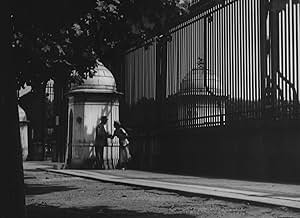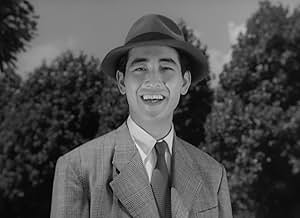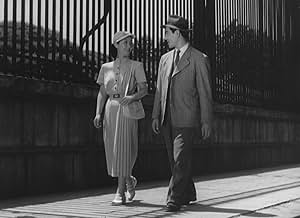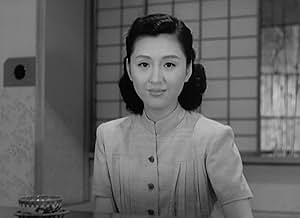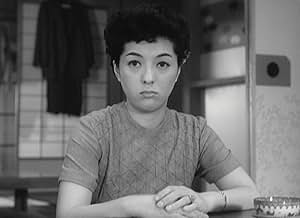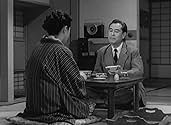AVALIAÇÃO DA IMDb
7,6/10
4,1 mil
SUA AVALIAÇÃO
Um casal de meia-idade sem filhos enfrenta uma crise conjugal.Um casal de meia-idade sem filhos enfrenta uma crise conjugal.Um casal de meia-idade sem filhos enfrenta uma crise conjugal.
- Prêmios
- 1 vitória no total
- Direção
- Roteiristas
- Elenco e equipe completos
- Produção, bilheteria e muito mais no IMDbPro
Avaliações em destaque
Another sensitive Ozu film about family. In this one, a somewhat upper-class woman resents her more simple, middle-class husband (by arranged marriage), while also encouraging her niece to go to arranged marriage meetings. As always with Ozu, I found an awful lot to like about this movie, but I wasn't quite enamored enough to gush over it. Most of the core cast is superb, although it's not Ozu's usual team (Setsuko Hara is nowhere to be seen, although Chishu Ryu and Chikage Awashima have minor roles). Michiyo Kogure might be a little too nasty, but I have to say it's kind of refreshing to see a less restrained character in an Ozu film. Perhaps the film wraps up too nicely and neatly, going too obviously for a touching moment, but I wouldn't say it's entirely unwarranted. At any rate, I enjoyed the film with its insights and gentle humor.
"The flavour of green tea over rice" is both a typical Ozu movie and one that defiates from his usual format in some respects.
Typical Ozu is the emphasis on small- and not on big emotions. The story is, as usual. Situated in the post World War II era, and the influence of the United States on the Japanese society is clearly visiblle (baseball match).
In most of the Ozu films the central relations are between children and parents (at the beginning of his career) or between parents and grandparents (later in his career). In "The flavour of green tea over rice" it is a married couple that forms the center of the film. Their marriage was arranged and is not in good shape. You can feel it when the man returns home from his work and the greeting of the two spouses is lukewarm at best.
The woman seems independent and emancipated at first. She has her female friends and she likes going out with them. As the film progresses she becomes however less and less sympathetic. In front of her female friends she expresses herself very disrespectfully about her husband (a dummy), whom we get to know as a person of great integrity. She happens to be of richer descent than her husband and dislikes his "cheap taste" (maybe being a snob herself).
Although differences between genarations do play a lesser role than in most Ozu films, they aren't totally non existent either. Seeing the marriage between her uncle and aunt, a niece of the woman in a subplot vehemtly resists becoming trapped in an arranged marriage herself.
In one of the most beautiful happy ends I have ever seen the two spouses reconcile with each other. When the man arrives at home in the middle of the night from the airport the servants are already in bed. Man and woman together prepare a meal, in so doing discovering how their kitchen works (normally the woman never cooks herself). The act of preparing a meal is capable to bridge the gap that hitherto existed between man and woman, just like the act of eating a (delicious) meal is capable of bridiging tge gap between Protestants and Roman Catholics in "Babette's feast" (1987, Gabriel Axel). The meal in "The flavour of green tea over rice" is however very simple compared with "Babette's feast". It's not the food itself that does the trick, it is all about the small talk during the preparation. Ozu as the master of the small emotions at his very best.
Typical Ozu is the emphasis on small- and not on big emotions. The story is, as usual. Situated in the post World War II era, and the influence of the United States on the Japanese society is clearly visiblle (baseball match).
In most of the Ozu films the central relations are between children and parents (at the beginning of his career) or between parents and grandparents (later in his career). In "The flavour of green tea over rice" it is a married couple that forms the center of the film. Their marriage was arranged and is not in good shape. You can feel it when the man returns home from his work and the greeting of the two spouses is lukewarm at best.
The woman seems independent and emancipated at first. She has her female friends and she likes going out with them. As the film progresses she becomes however less and less sympathetic. In front of her female friends she expresses herself very disrespectfully about her husband (a dummy), whom we get to know as a person of great integrity. She happens to be of richer descent than her husband and dislikes his "cheap taste" (maybe being a snob herself).
Although differences between genarations do play a lesser role than in most Ozu films, they aren't totally non existent either. Seeing the marriage between her uncle and aunt, a niece of the woman in a subplot vehemtly resists becoming trapped in an arranged marriage herself.
In one of the most beautiful happy ends I have ever seen the two spouses reconcile with each other. When the man arrives at home in the middle of the night from the airport the servants are already in bed. Man and woman together prepare a meal, in so doing discovering how their kitchen works (normally the woman never cooks herself). The act of preparing a meal is capable to bridge the gap that hitherto existed between man and woman, just like the act of eating a (delicious) meal is capable of bridiging tge gap between Protestants and Roman Catholics in "Babette's feast" (1987, Gabriel Axel). The meal in "The flavour of green tea over rice" is however very simple compared with "Babette's feast". It's not the food itself that does the trick, it is all about the small talk during the preparation. Ozu as the master of the small emotions at his very best.
This is both typical and untypical Ozu - typical in that its a simple story with a typical simple point (but of course told with deceptive skill and complexity), but its unusual in that its set among the upper middle classes, not the 'average' Japanese family of most of his movies.
The story is straightforward - an unhappy marriage between a rich girl and her successful but relatively low born husband. She can't hide her contempt for his dullness and rustic ways. He is unhappy but never argues back, just finds his own little ways of getting pleasure out of life. A series of incidents finds them having an unexpected late night simple meal (green tea over rice is essentially 'leftovers' when nothing else is available) and suddenly she realizes she loves him after all.
As always with Ozu, the richness is in the characters. Taeko, played by Michiyo Kogure is spoiled and insensitive, but a compelling, capricious character. Mokicho (the husband) under his dull salary-man skin is really a sensitive, caring man. The other characters are all vivid and memorable, especially Setsuko, the headstrong niece. There are also wonderful set pieces, usually involving Taekos friends, having little girls nights together, gossiping about their husbands and plotting marriages.
With Ozu a brief overview of his movies always makes him sound dull. But in reality this is funny, moving and compelling. Its not first rate Ozu - the theme of the movie is too straightforward and obvious, the ending a little too neat and tidy. But second rate Ozu is still head and shoulders above almost any other drama. The humanity of the characters shines through, creating a little world we can sink into. The wonder of Ozu is that we are not observing characters, we are sitting with them, in the middle of their lives.
I can't help but compare this to Naruse's 'Repast', another movie about a marriage in trouble, where the wife cannot hide her contempt for her husband, but in the end they both realize why they love each other. Naruse was more of a pessimist, so the reconciliation at the end of Repast is both happy and sad, as the characters realize that that living together, even without a great love, is better than being lonely. In Ozu's more traditional world, the couple (product of an arranged marriage) eventually find love, even after many years of marriage by the acceptance of each others little foibles. Taeko learns that simple things can be as pleasurable as luxury. It seems a little trite, and it would be in another film makers hands, but somehow Ozu finds depths of wisdom even in such clichés.
The irony is that Ozu was a lifelong bachelor, yet he made perhaps the best movies ever made at examining families in detail. If I had my way I'd put this movie and 'Repast' as compulsive viewing for all engaged couples. It would be more effective than any pre-marriage course!
The story is straightforward - an unhappy marriage between a rich girl and her successful but relatively low born husband. She can't hide her contempt for his dullness and rustic ways. He is unhappy but never argues back, just finds his own little ways of getting pleasure out of life. A series of incidents finds them having an unexpected late night simple meal (green tea over rice is essentially 'leftovers' when nothing else is available) and suddenly she realizes she loves him after all.
As always with Ozu, the richness is in the characters. Taeko, played by Michiyo Kogure is spoiled and insensitive, but a compelling, capricious character. Mokicho (the husband) under his dull salary-man skin is really a sensitive, caring man. The other characters are all vivid and memorable, especially Setsuko, the headstrong niece. There are also wonderful set pieces, usually involving Taekos friends, having little girls nights together, gossiping about their husbands and plotting marriages.
With Ozu a brief overview of his movies always makes him sound dull. But in reality this is funny, moving and compelling. Its not first rate Ozu - the theme of the movie is too straightforward and obvious, the ending a little too neat and tidy. But second rate Ozu is still head and shoulders above almost any other drama. The humanity of the characters shines through, creating a little world we can sink into. The wonder of Ozu is that we are not observing characters, we are sitting with them, in the middle of their lives.
I can't help but compare this to Naruse's 'Repast', another movie about a marriage in trouble, where the wife cannot hide her contempt for her husband, but in the end they both realize why they love each other. Naruse was more of a pessimist, so the reconciliation at the end of Repast is both happy and sad, as the characters realize that that living together, even without a great love, is better than being lonely. In Ozu's more traditional world, the couple (product of an arranged marriage) eventually find love, even after many years of marriage by the acceptance of each others little foibles. Taeko learns that simple things can be as pleasurable as luxury. It seems a little trite, and it would be in another film makers hands, but somehow Ozu finds depths of wisdom even in such clichés.
The irony is that Ozu was a lifelong bachelor, yet he made perhaps the best movies ever made at examining families in detail. If I had my way I'd put this movie and 'Repast' as compulsive viewing for all engaged couples. It would be more effective than any pre-marriage course!
The Flavour of Green Tea over Rice (Ochazuke no aji) is an Ozu film; a subdued drama analyzing the transformation of Japan post-WWII in small, personal ways. This film follows a childless married couple as they navigate changing traditions, conceptions of marriage, and love. The relationship between the two is strained - the husband is a simple country man who enjoys his country cigarettes, riding in the third class passenger car of trains, and throwing himself into his work with tact and politeness. The wife is a city girl, enjoying spa days, expensive and luxurious decorations, and first class train rides. These two struggle to relate to each other, in a marriage that was set up over a decade ago as an arranged marriage.
The catalyst to this film is when their headstrong niece comes to stay. A product of the new Japan, she is not interested in an arranged marriage, and instead wants to meet someone through dating, and marry for love, not familial status. This is scandalous to both her parents and our married couple. However, the two begin to see each other in a new light, engaging with new ideas, trying new things, and ultimately coming together in a touching and mute scene of culinary exploration and intimacy.
Ozu has a way with scenes. Each scene is meticulously detailed, and dripping with meaning, while maintaining a muted, quite feel. Ozu is, of course, a master of film making of this era, and this film is no different. It poignantly portrays the changing nature of relationships, love and marriage in Japan with subtlety, grace, and beauty. There are many wonderful scenes and shots in this film, and it is an Ozu film worth watching.
Complaints-wise, this film feels much slower then many of Ozu's films, almost to the point of not really moving. This seems to be a stylistic choice that compliments the thesis of the film, but also makes the film a bit distractable at times. Scenes feel like they jump at times, and the chronology of events, while supposed to be clear, is often not, for brief moments.
A wonderful film in many ways that just, barely, lacks the Ozu charm and perfection that is common in films like Tokyo Story, for example. Even so, this is a lovely, sweet and touching film that is easily watchable, and contains many of the charms of Ozu's work. Easy recommendation for fans of Ozu, or fans of quite, small and beautiful stories and dramas.
The catalyst to this film is when their headstrong niece comes to stay. A product of the new Japan, she is not interested in an arranged marriage, and instead wants to meet someone through dating, and marry for love, not familial status. This is scandalous to both her parents and our married couple. However, the two begin to see each other in a new light, engaging with new ideas, trying new things, and ultimately coming together in a touching and mute scene of culinary exploration and intimacy.
Ozu has a way with scenes. Each scene is meticulously detailed, and dripping with meaning, while maintaining a muted, quite feel. Ozu is, of course, a master of film making of this era, and this film is no different. It poignantly portrays the changing nature of relationships, love and marriage in Japan with subtlety, grace, and beauty. There are many wonderful scenes and shots in this film, and it is an Ozu film worth watching.
Complaints-wise, this film feels much slower then many of Ozu's films, almost to the point of not really moving. This seems to be a stylistic choice that compliments the thesis of the film, but also makes the film a bit distractable at times. Scenes feel like they jump at times, and the chronology of events, while supposed to be clear, is often not, for brief moments.
A wonderful film in many ways that just, barely, lacks the Ozu charm and perfection that is common in films like Tokyo Story, for example. Even so, this is a lovely, sweet and touching film that is easily watchable, and contains many of the charms of Ozu's work. Easy recommendation for fans of Ozu, or fans of quite, small and beautiful stories and dramas.
This film mines much of the territory of Ozu films, including the complex relationships of the major characters, the resistance of a young lady to agree to an arranged marriage and the aesthetics of everyday living amongst the working classes. The film has two main stories, parallel to each other, running through it: Takeo, who is bored with her husband who is very simple in his needs, lies to him so she can go to a spa with her friends. Their niece, the pretty Setsuko, is the one who is resisting the arranged marriage meeting. How the two stories bisect is typical Ozu, creating conflict and anger. This film is not as good as much of Ozu's output at the time, but that includes "Tokyo Story", "Early Summer" and "Late Spring", which are standout classics. The great Setsuko Hara is not in this film and the equally great Chishu Ryu is a bit player, but I think you'll still find this film worthy of your time. If you haven't seen an Ozu film, start with "Tokyo Story" or "Late Spring" (others too, including "Good Morning" and "Autumn Afternoon") but give this a try. I don't think you will be disappointed.
Você sabia?
- CuriosidadesAt the start of the film, two characters mention going to see a new film with Jean Marais. The film was most likely Orfeu (1950), which was released in Japan in June 1951.
- Citações
Taeko Satake: Think well before you pick your groom, it's important.
- ConexõesFeatured in David Bordwell on 'The Flavor of Green Tea Over Rice' (2019)
- Trilhas sonorasLove's Old Sweet Song
Composed by J.L. Molloy (as James Lyman Molloy)
Principais escolhas
Faça login para avaliar e ver a lista de recomendações personalizadas
- How long is The Flavor of Green Tea Over Rice?Fornecido pela Alexa
Detalhes
- Data de lançamento
- País de origem
- Idioma
- Também conhecido como
- The Flavor of Green Tea Over Rice
- Locações de filme
- Empresa de produção
- Consulte mais créditos da empresa na IMDbPro
- Tempo de duração
- 1 h 56 min(116 min)
- Cor
- Mixagem de som
- Proporção
- 1.37 : 1
Contribua para esta página
Sugerir uma alteração ou adicionar conteúdo ausente


